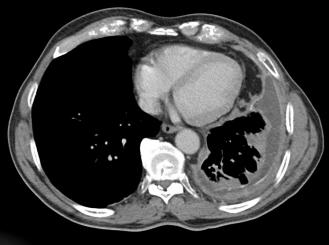Oct 13, 2016
By Brook Spencer and Tom John, PhD, FRACP, MBBS
Over the last few years, interesting advancements have been made in the development of treatments for mesothelioma. One of the forms of treatment where success has been seen is with immunotherapy.
Tom John, PhD, FRACP, MBBS, served as a discussant for the Lung Cancer—Non-Small Cell Local-Regional/Small Cell/Other Thoracic Cancers Oral Abstract Session during the 2016 ASCO Annual Meeting, where he provided an update on studies related to mesothelioma treatment and survival. Given his expertise in this area, Dr. John has offered some insights about how immunotherapy in particular is providing hope in mesothelioma treatment.
In particular, immune checkpoint inhibitors have recently shown encouraging results for patients with mesothelioma. However, when speculating about whether we may continue to see improvements in treatment, Dr. John says physicians should be “cautiously optimistic.
"We finally have some drugs that are showing great promise in mesothelioma, but they do not work in everyone," he said. "We need to temper our enthusiasm so that we can figure out exactly who benefits from these drugs and determine whether there is a way to manipulate the immune response to also help those that don't benefit.”
More trials are necessary to determine exactly what mechanisms work in different forms of mesothelioma and in other malignancies. “It is important that we generate data and don't just use immunotherapies on everyone without asking questions. If we can do that, I have no doubt that we will continue to see improvements and hopefully turn mesothelioma into a chronic disease,” he said.
At the 2016 ASCO Annual Meeting, Dr. John discussed two trials (Abstracts 8502 and 8503) that showed potentially discouraging results for checkpoint inhibitors for second-line treatment for mesothelioma, underscoring the need for continued research in this field.
"We need to continue to perform high-quality studies, and the fact that both of these studies are the largest immunotherapy trials in mesothelioma to date show that researchers and patients are willing to explore novel options. The JAVELIN trial showed 50% of patients had either a reduction in the size of their tumours or no growth. While the absolute response rate was low at 10%, to show that 50% of patients benefited is encouraging," Dr. John said. “We can do a lot better, though, and immunotherapy combinations are now being investigated. I am encouraged that immunotherapy targeting the PD-1/PD-L1 axis is a new strategy for some patients. It would be nice to see higher response rates and better survival data; this will undoubtedly come with time.”
In recent months, the Cancer Moonshot Initiative pointed to immunotherapy as a potential way to reach the goal of rapidly advancing the progress of cancer research, and this increased attention may facilitate more clinical trials to test various treatment types. “Clinical trials are the only way of determining the best therapeutic options for patients,” Dr. John said. “The DETERMINE study showed that when you balance the types of patients who received placebo versus the immunotherapy that there was no difference in survival. Without this large study, we would still be relying on data extrapolation from two small phase II studies with less than thirty patients involved in each study. There are so many other immunological targets being developed, and mesothelioma needs initiatives like the Moonshot to enable such research to be performed in rare cancers."
Geographic disparities in access to clinical trials pose a challenge to research in rare diseases such as mesothelioma. “In Australia, mesothelioma has a relatively high incidence, although it remains a rare disease. There is a role for patients with rare diseases to receive their care in specialized centers rather than in any oncology center. This currently occurs for diseases like sarcoma and leukemia, and it may be useful to set up specific trial centers for people with mesothelioma. That way, the onus is not on patients to find the right trial for them, but rather on those centers to have mesothelioma-specific studies,” Dr. John said.
One such trial that could show interesting results is the delivery of immunotherapy before surgery, which is currently being evaluated at Baylor College of Medicine. “It is apparent that there are some ways to improve immunological responses,” Dr. John said of the trial. “One of these mechanisms is through surgery, and such trials are important. Unfortunately, these trials will be limited to patients who are fit enough for surgery in the first instance and will be dependent on the expertise of the surgeon, a factor that is difficult to control for. But it remains a very important study that we are hoping will see some people cured of their disease.”
Overall, Dr. John is hopeful that immunotherapy can offer a positive step forward in the fight against mesothelioma, and against cancer generally, and in the provision of personalized, precision medicine.
Dr. John is a medical oncologist, associate professor, and senior clinical research fellow at the Olivia Newton-John Cancer Research Institute, Melbourne, Australia. Brook Spencer is the community outreach director at the Mesothelioma Cancer Alliance.

